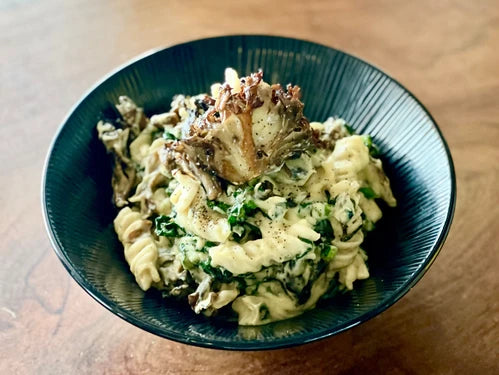On Trend
Kale chips, avocado toast, fried Brussel sprouts, celery juice, cauliflower wings. Catch a theme here? All of these are great food trends over the past decade or so that have allowed for more people to eat more plants. Cauliflower is not only a popular bar menu item, it can be used to make “rice,” “steaks,” and can be a great addition to a stir fry, grain bowl, curry, or taco!
As we have a new menu special this week, we wanted to highlight this powerhouse plant. Try our Organic Alfredo Pasta. This special comes complete with organic fusilli pasta in a creamy house made cauliflower alfredo sauce with savory maitake mushrooms and crispy onions.

Health Benefits
Cauliflower is a cruciferous vegetable which falls within the brassica family. Cruciferous vegetables are considered quite literally superfoods when it comes to health benefits. Other brassica members include broccoli, cabbage, bok choy, Brussel sprouts, watercress, and kale, among others. Cruciferous vegetables hold an incredible amount of nutrients and bioactive compounds with a significant emphasis on phytochemicals. They can prevent oxidative stress, stimulate the immune system, decrease the risk of cancer, and promote detoxification enzymes. Cauliflower is high in fiber, boosting gut health and Vitamin K, encouraging bone health. It’s also antioxidant rich due to the polyphenols and sulfur-organic compounds.(1)

Sulforaphane
Cruciferous vegetables can also potentially prevent DNA damage, target breast cancer stem cells, and detoxify the liver. The reasoning for all of these discussed benefits is said to be the anti-cancer agent, sulforaphane, almost exclusively found among the brassica family. Sulforaphane is also known to help manage type 2 diabetes, protect the brain and eyesight, and reduce nasal allergy inflammation.
According to a placebo-controlled, double-blind, randomized trial, sulforaphane was actually found to help treat autism among boys. Researchers from Harvard University and John Hopkins suggested that their findings may be due to the detoxicant role of sulforaphane. They noted that about two to three cruciferous vegetable servings worth of sulforaphane a day improved social interaction, verbal communication, and abnormal behavior within a matter of weeks.(2)

The formation of the sulforaphane requires the mixture of myrosinase, an enzyme and a precursor compound. The chopping and/or chewing of the vegetable allows the sulforaphane to be created. However, the sulforaphane can actually be inactivated when cooked. There’s a trick though, you can chop the cauliflower, or other cruciferous veggie, and wait about 40 minutes; then the sulforaphane is already made and ready to go.(3) So, while prepping your next meal, chop your kale, cauliflower, or Brussel sprouts ahead of time before they hit the heat to get maximum results.
1. Kapusta-Duch J, Kopeć A, Piatkowska E, Borczak B, Leszczyńska T. The beneficial effects of Brassica vegetables on human health. Rocz Panstw Zakl Hig. 2012;63(4):389-95. PMID: 23631258.
2. Greger, M., & Stone, G. (2018). 205. How not to die: Discover the foods scientifically proven to prevent and reverse disease. Pan Books.
3. ibid





Leave a comment
This site is protected by hCaptcha and the hCaptcha Privacy Policy and Terms of Service apply.